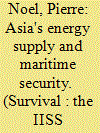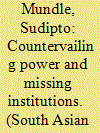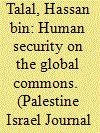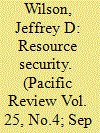| Srl | Item |
| 1 |
ID:
130868


|
|
|
|
|
| Publication |
2014.
|
| Summary/Abstract |
Asia's reliance on international, seaborne energy trade is conducive to strategic cooperation. Whether this will outweigh strategic competition is far from certain. The Asia-Pacific accounts for a large and growing share of the world's energy-demand growth. With imports rising faster than consumption, the region is rapidly becoming the new centre of gravity for global energy markets. Such dynamics have made energy security a key policy concern for Asian states. The naval capacities of these countries are also growing swiftly, prompting some analysts to ask whether an arms race has begun. Although no one would suggest that this build-up of naval power is primarily driven by the need to secure energy supplies, the Chinese and Indian governments have identified energy and resource security as one rationale for developing naval power, particularly blue-water capabilities.
|
|
|
|
|
|
|
|
|
|
|
|
|
|
|
|
| 2 |
ID:
099611


|
|
|
|
|
| Publication |
2010.
|
| Summary/Abstract |
Providing resource security for one group of stakeholders frequently entails loss of a certain degree of resource security for another group of stakeholders. The competing interests of winners and losers, and the 'public good' nature of many resource uses, makes it challenging to provide resource security in a benign and equitable manner. Power relations are key in determining compensation outcomes, and in particular the importance of countervailing power, in the absence of autonomous institutions with regulatory authority. When one group has overwhelming market power, or political power or a combination of the two, that group's interest will drive the outcome, regardless of the technical principles of compensation. The article demonstrates through examples how the dynamics of countervailing power works in the national context and in the global context. It also highlights the usefulness of autonomous institutions with jurisdiction over resource security issues. Institutions can protect the interest of stakeholders who do not have either economic power or political power.
|
|
|
|
|
|
|
|
|
|
|
|
|
|
|
|
| 3 |
ID:
085341


|
|
|
|
|
| Publication |
2008.
|
| Summary/Abstract |
The term "human security" was coined to shift the focus of security from the state to the individual, to emphasize from fear and want.
|
|
|
|
|
|
|
|
|
|
|
|
|
|
|
|
| 4 |
ID:
114815


|
|
|
|
|
| Publication |
2012.
|
| Summary/Abstract |
Following a historical commitment to multilateralism, in the last decade the trade policy initiatives of many states in the Asia-Pacific have turned to bilateralism through the negotiation of free trade agreements (FTAs). The corresponding proliferation of regional FTAs has thus far been understood to result from three broad motivations: a desire to advance trade liberalization beyond World Trade Organization (WTO) disciplines; mercantilistic efforts to secure preferential access to key export markets; and/or attempts to use FTAs to secure non-economic political gains. This paper argues that since the middle of the decade a new motive has emerged - the use of FTAs to improve resource security - particularly by import-dependent resource consumers in Northeast Asia. As yet unexamined in the literature, this paper seeks to document and explain this trend. It analyses the recent emergence of resource security concerns as a new FTA motive; the corresponding shifts in the FTA strategies and initiatives of Japan, Korea and China; and the dynamics of an emerging race for resource-related FTAs between the three governments. Based on this analysis, it demonstrates that resource-related FTAs could potentially improve consumers' resource security through either the liberalization of trade, the extension of investment protections or broader diplomatic gains with the targeted supplier. However, owing to supplier reluctance to enter into binding policy commitments for resource industries, their track record shows success in only the diplomatic dimension, and the prospects for a strengthening of their effects are poor. As a result, it is argued that while resource concerns have become a key motive for FTA initiatives in the Asia-Pacific region, they have not substantively improved resource security for its import-dependent states and are unlikely to do so in the future.
|
|
|
|
|
|
|
|
|
|
|
|
|
|
|
|